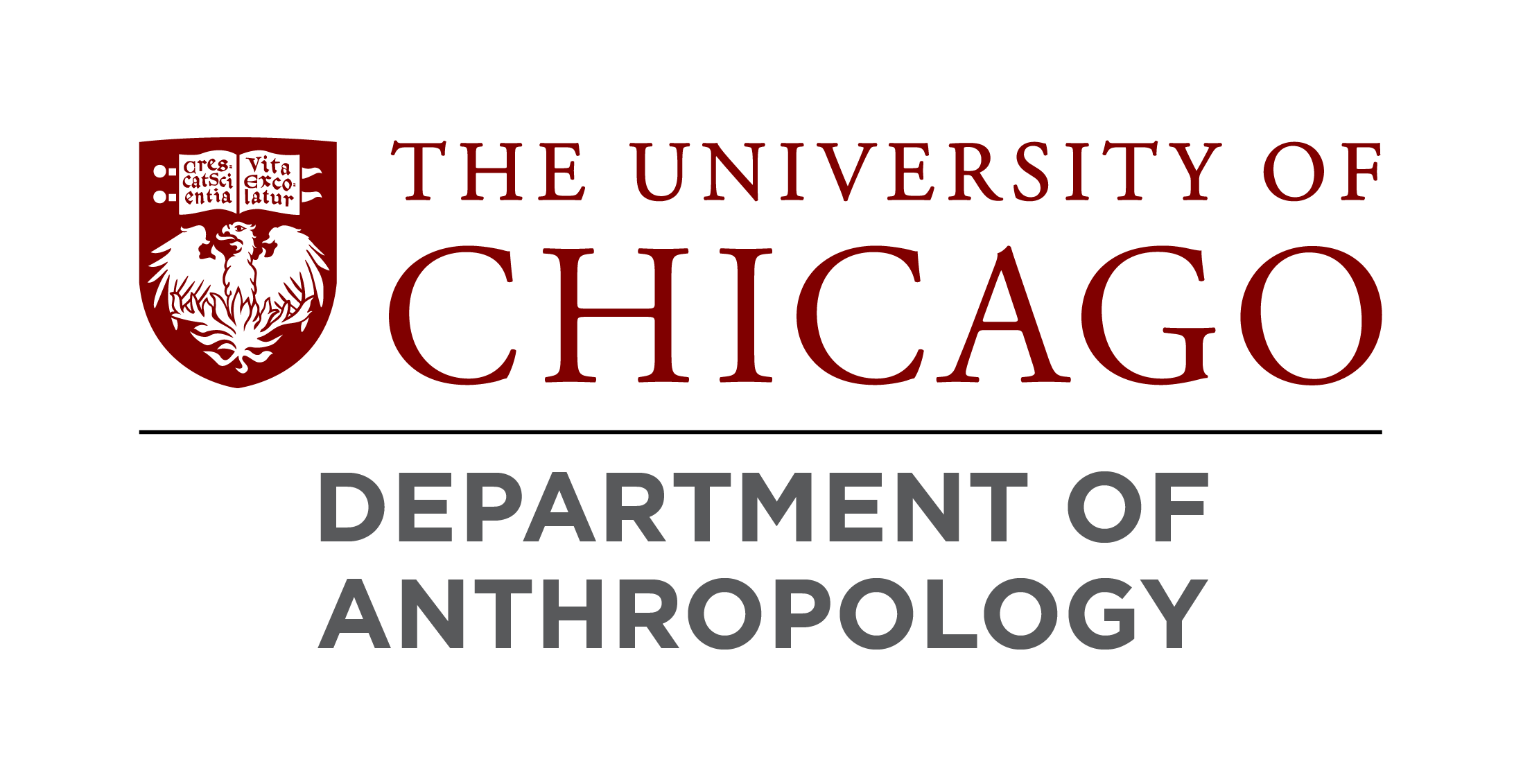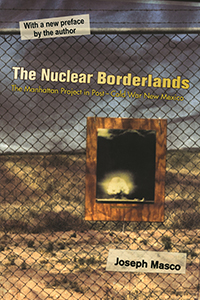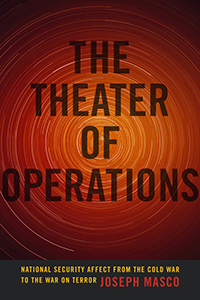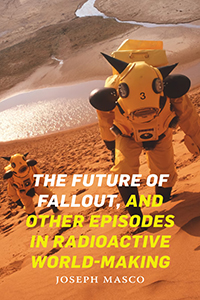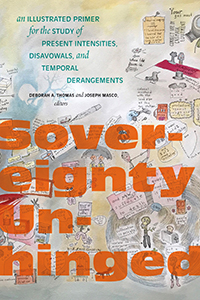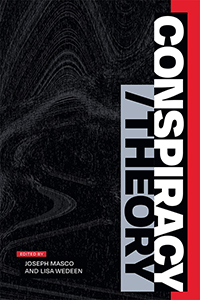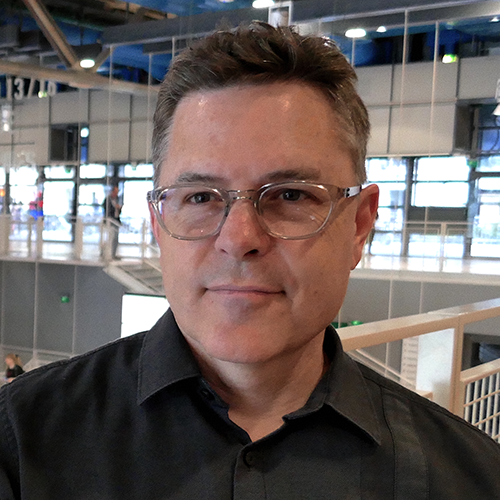
Joseph Masco is a scholar of technoscience, ecology, affect, and social theory, with a long-term focus on technological revolutions and their aftermaths in the United States after 1945. He explores how technological advancements, particularly within the framework of national security, have reshaped ecological conditions, public perceptions of risk and threat, and concepts of citizenship, race, and futurity.
Books:
Masco is the author of a trilogy on US nuclear nationalism and the psychosocial politics of existential danger, tracking the interplay between material infrastructures, affects, and imaginations:
The Nuclear Borderlands: The Manhattan Project in Post-Cold War New Mexico (Princeton University Press, 2006; new edition with preface 2020) is a multi-sited ethnographic investigation into the long-term effects of the atomic bomb project in New Mexico. It explores how a half century of national security science in Los Alamos differentially remade local understandings of risk, citizenship, ecology and race during and after the Cold War. The Nuclear Borderlands won the Robert K. Merton Prize from the American Sociological Association's Section on Science, Knowledge, and Technology, the Rachel Carson Prize from the Society for the Social Studies of Science, and the J. I. Staley Prize from the School for Advanced Research.
The Theater of Operations: National Security Affect from the Cold War to the War on Terror (Duke University Press, 2014) is a multi-modal (ethnographic, historical, and mass media) study of the transformation of the Cold War national security apparatus into a counterterror state after 2001. Attending to the interplay between technological revolution, imaginaries of danger, and affective mobilizations, The Theater of Operations shows how hypothetical dangers for security experts can overwhelm attention to existing forms of violence in the United States. It also offers a new theorization of threat perception, considers the psychosocial pull of negative futurities within American society since 1945, and demonstrates how affects and imaginaries are infrastructural, much like built technical systems
The Future of Fallout, and Other Episodes in Radioactive World-Making (Duke University Press, 2021) gathers writings that examine the strange American intimacy with and commitment to existential danger. Tracking the simultaneous production of nuclear emergency and climate emergency since 1945, Masco focuses on the psychosocial accommodations as well as the technological revolutions that have produced these linked planetary scale disasters. Masco assesses the memory practices, visual culture, concepts of danger, and toxic realities that, in combination, have generated a US national security culture that promises ever more safety and comfort in everyday life but does so only by generating, and deferring, a vast range of violences into the collective future. Interrogating the fallout (i.e., the material and conceptual lags from decades of nuclear nationalism and petrochemical capitalism) that inform life in the twenty-first century, Masco identifies key moments where other futures were still possible, and seeks to activate an alternative, post-national security, political imaginary in support of collective life today.
Edited Volumes
Masco has co-edited two collections:
Sovereignty Unhinged: An Illustrated Primer for the Study of Present Intensities, Disavowals, and Temporary Derangements with Deborah Thomas (Duke University Press, 2023). This volume offers a comparative ethnographic consideration of the multi-faceted challenges to personal agency in the 21st century. It explores the affective, imaginative, and survival projects that emerge from living within ongoing states of emergency, across war and revolution, labor and globalization, health and environment.
Conspiracy/Theory with Lisa Wedeen (Duke University Press, 2024). Via comparative historical and ethnographic perspectives, this volume reassesses the epistemological terms of conspiratorial reason, seeking to add new precision to the categories of thought marked as conspiracy, conspiracy theory or critical theory. Acknowledging mediascapes structured by disinformation, misinformation, and those profiting from polarization, Conspiracy/Theory offers a new theorization of the role of narrative in collective life, reassesses epistemological challenges in the emerging infosphere, and seeks to identify the terms for positive collective worldmaking.
Cowritten
(with Tim Choy, Jake Kosek, and M. Murphy as the More Worlds Collective):

Fear of a Dead White Planet asks: How does one study when the planet is on fire? The More Worlds Collective challenges the contemporary rush to planetary technofixes for environmental emergency. Instead, it tracks how such planetary-science frames are enmeshed in the longstanding projects of White Supremacy, settler colonialism, and epistemological violence. Calling for unlearning and joined-up study, the collective reclaims terraforming from off-earth engineering schemes to think through how our more modest efforts to study differently are also world-making and world-breaking. In orienting its work toward terra and formation, the collective commits to a place-based, non universal study scaled at levels both intimate and massive. Through its serious but unruly methods, Fear of a Dead White Planet invites readers to recognize and conjure alternate worlds in and around the university.
Masco's research has been supported by the American Council of Learned Societies, The John D. and Catherine T. MacArthur Foundation, the National Endowment for the Humanities, and The Wenner-Gren Foundation. He has been a residential fellow at the School for Advanced Research (Santa Fe), held a Benjamin Meaker Visiting Professorship at the Institute for Advanced Study (University of Bristol), and has been a Member of the Institute for Advanced Study (Princeton). Masco served as Chair of the Department of Anthropology from 2019-2022 and maintains faculty appointments in the Committee for Conceptual and Historical Studies of Science, the Committee on Environment, Geography, and Urbanization, and at the Chicago Center for Contemporary Theory. In 2017, he received the Faculty Award for Excellence in Graduate Teaching and Mentoring at the University of Chicago.
Recent Research / Recent Publications
2024 “A False Flag” in Joseph Masco and Lisa Wedeen (eds) Conspiracy/Theory. Durham: Duke University Press.
2023 “The Condition of Our Condition” in Deborah Thomas and Joseph Masco (eds) Sovereignty Unhinged: An Illustrated Primer for the Study of Present Intensities, Disavowals, and Temporary Derangements. Durham: Duke University Press.
2022 “The Artificial World” in Natasha Myers, Dimitris Papdopoulos, Maria Puig de la Bellacasa (eds) Reactivating Elements: Substance, Process and Method from Chemistry to Cosmology. Durham: Duke University Press.
2022 “Optics of Exposure” in Bernadette Bensuade Vincent, Soraya Boudia, and Kyoko Sato (eds) Living in a Nuclear World: From Fukushima to Hiroshima. London: Routledge.
2021 “Desolate Dreams” in Lyle Massey and James Nisbet (eds) The Invention of the American Desert. Berkeley: University of California Press.
2020 “Flashblindness” in John O’Brian and Claudette Lauzon (eds) Through Post-Atomic Eyes. McGill-Queen’s University Press.
2019 “Anticipation” in Anand Pandian and Cymene Howe (eds) Anthropocene Unseen: A Lexicon. Brooklyn: Punctum Books.
2019 “Ubiquitous Surveillance” in Catherine Besteman and Hugh Gusterson (eds) Life by Algorithms: How Algorithms are Remaking Social Life. Chicago: University of Chicago Press.
2017 “The Six Extinctions: Visualizing Planetary Ecological Crisis Today” Environmental Philosophy 14(1): 11-40.
2015 “Anthropology and the Security State” written with John Borneman, American Anthropologist 117(4): 781-94.
 THE UNIVERSITY OF CHICAGO
THE UNIVERSITY OF CHICAGO

